An article of mine about anti-haredi bias appeared in Haaretz earlier this week. It’s accessible here.
If you aren’t an Haaretz subscriber or registrant, send an e-mail to rabbiavishafran42@gmail.com and I’ll e-mail you a copy.
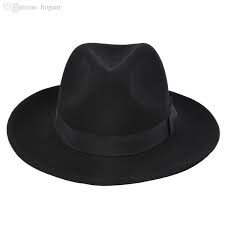
An article of mine about anti-haredi bias appeared in Haaretz earlier this week. It’s accessible here.
If you aren’t an Haaretz subscriber or registrant, send an e-mail to rabbiavishafran42@gmail.com and I’ll e-mail you a copy.

Enough decades have passed to allow some of us to recall biologist Paul R. Ehrlich’s 1968 bestseller “The Population Bomb,” in which the author, soberly analyzing relevant data, predicted worldwide famine within twenty years as a result of rising birth rates and limited resources. Hundreds of thousands, he prophesied, would starve to death by 1988. He compared the “population explosion” to the uncontrolled growth of cancer cells,
That blessedly inaccurate prediction was embraced by legions of other scientists. In 1970, Harvard biologist George Wald went further, predicting that, without immediate action to reverse trends, “civilization will end within 15 or 30 years.”
The renowned physicist Lord Kelvin stated in 1895 that “heavier-than-air flying machines are impossible.” And Albert Einstein, in 1932, contended that “There is not the slightest indication” that nuclear energy “will ever be obtainable.”
We do well to remember pronouncements like those when trying to extrapolate the future from present knowledge, or present assumptions. Unfortunately, some people, especially when trying to promote agendas, don’t, or won’t.
The same some of us with those decades in their rear-view mirrors may also remember the days when the Reform movement just went about its business of jettisoning the Jewish mesorah for the “benefit” of its congregants, and was so sure of its future prospects that it essentially ignored Jews who remained faithful to the Jewish mission as handed down since Mattan Torah. It certainly didn’t see a need to attack those “old fashioned” fanatics. They wouldn’t be around much longer.
Ah, times have changed.
Eric H. Yoffie, the former president of the Union for Reform Judaism and now a writer for Haaretz, has taken up the cause of castigating Jews who have the audacity to maintain Judaism.
In a recent opinion piece in that paper, he accuses “the ultra-Orthodox political leadership” in Israel of “destroying the State of Israel.” In case the reader might assume he is waxing metaphorical, he adds, “Literally.”
The destruction, in his telling, is being wrought by the determined prevention of “Haredi Jews from becoming productive citizens in a modern, developed economy.”
“Lovers of Torah,” like himself, he bemoans, “can only weep.”
The objects of his ire might well respond, “Don’t cry for me, Eric Yoffie.”
The Haaretz writer seems to be under the impression that Israeli Jews are forced to eat kosher and keep Shabbos (may they all come on their own to do both, and more). What else could he mean by the chareidi “massive machinery of religious coercion”? Respect for halachah at the Kosel Maaravi? Oversight of geirus, kiddushin and geirushin to prevent personal tragedies down the line? Coercion? Uh, no.
The Reform leader’s real bugaboo, though, is the growth of the chareidi community and the concomitant growth of limud Torah in Israel.
He quotes a Tel Aviv professor who is “worried that in 40 years, Israel will be more crowded than any country in the world, except for Bangladesh.” Shades of Paul Ehrlich.
And, the writer contends, “Israel’s rate of poverty is exceedingly high…; its labor productivity is disturbingly low, and continuing to fall.”
“To say that this picture is a grim one,” Yoffie writes grimly, “is an understatement.”
He admits that “the problem is not the employment rate of women.” Men, though, he explains, “are directed by their rabbis to forsake the labor market for full-time Torah study.” In the 1980s, he continues, “the employment rate for Haredi men was 64%. In 2015, slightly less than 54% of Haredi men were employed. Two years later, that number had dropped to 51%.”
When the sky is falling, there just isn’t time to do any digging. What Yoffie doesn’t note is that, as Israel Democracy Institute researchers report, “Since 2003, there has been a consistent rise in the employment rate of [chareidi] women and men.”
But, of course, Yoffie’s issue isn’t really employment. If it were, he would be advocating to provide those who, as a matter of religious principle, are unable to enter the army with the same access to gainful employment as ex-soldiers. His issue is the intolerable willingness of so many Jewish men to dedicate themselves to full-time Torah study for as long as they can, and their readiness to live modestly, resisting the societal shitah that determines “success” by the size of bank accounts.
Yoffie’s “solution” to the crisis he perceives consists of changing the nature of chinuch in Israel and offering a full complement of “core curriculum” studies “of course… alongside traditional Torah study.”
And accomplishing that, he contends, can only happen through “compulsion.”
Fittingly, his piece appeared just as Chanukah was about to begin.
© 2018 Hamodia
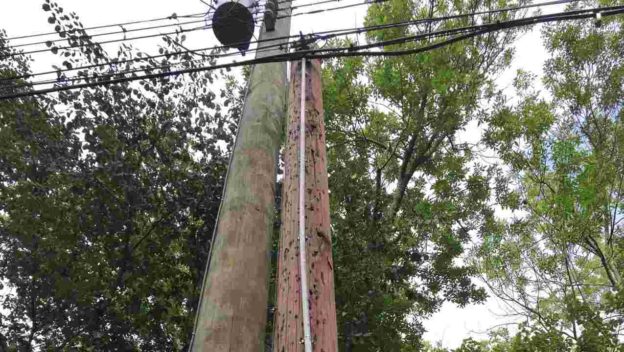
You’d think it was a Purim joke. But, no, “Operation Schtickle Pioneer” is a thing.
At least in one person’s mind.
Did you know that a Jewish cabal is planning to make “large areas of public property… [into] extension[s] of private Jewish households,” and that concerned citizens are, as a result, “under siege by members of religious groups backed by the Agudath Israel of America”?
Neither did I. But one anonymous New Jersey activist, the baal habayis of a new website, knows better. He informs us that the Agudah has “instructed its followers to start taking over areas within 1.5 hours of Manhattan in an attempt to ‘convert’ them to the Hasidic way of life.”
And that the national Orthodox organization has named its nefarious plot, yes, “Operation Schtickle [sic] Pioneer.”
A moment’s thought and a bit of imagination yield the realization that that Mr. NoEruv is referring to the scandalous practice of putting pieces of plastic piping on some utility poles to serve as lechis for eruvim. Indeed, he christened his site “NoEruv.” And he has a warning for us plotters: “We have you and know how you operate.”
Confused? Let us, as the Chinese saying goes, feing ohn fun der unfaing, or start at the beginning.
That would be Agudath Israel 93rd national convention, which took place in 2015. At one of the many sessions during the multi-day event, long-time Agudath Israel Vice President for Community Services Rabbi Shmuel Lefkowitz addressed the topic of the Orthodox community’s “Growing Pains” – the unaffordability of housing born of the tzibbur’s growth.
Rabbi Lefkowitz made a radical (well, to some) suggestion, namely that people who were raised in places like Borough Park, Flatbush, Manhattan or Lakewood consider living in somewhat off-the-beaten-track locales. He didn’t go quite so far as I once did when I suggested establishing Satmarer in Sioux City, moving Telshers to Tuskegee and Y.U.ers to Wyoming. More modestly, he simply asked his listeners to consider buying homes in outlying boroughs and suburbs in New York and New Jersey.
And he said, several times, without a hint of ominousness, “You can be a shtickel pioneer.”
Thus – under the direction, presumably, of the Elders of Zion – was born “Operation Schtickle Pioneer.”
Our anonymous anti-eruvite managed to mangle, if only in his heady head, an innocent endorsement of Jews’ setting their homestead horizons a bit beyond their comfort zones into a nefarious plot by scheming rabbis to “instruct their followers on how to convert townships in New Jersey.”
The would-be lechi-liquidator is understandably frustrated. Several weeks ago, the township of Mahwah, New Jersey, which had halted the building of an eruv, reached a settlement that included not only the resumption of the eruv-building but also the town’s pledge to not interfere in its maintenance and upkeep, and to provide a police escort for any such work (as vandals had previously torn down lechis).
It also agreed to pay the Bergen Rockland Eruv Association at least $10,000 in legal fees.
For its part, the Eruv Association agreed to switch the white PVC pipes it had been using for elements that better blend in with the utility poles.
The settlement was the result of a lawsuit last October by then-State Attorney General Christopher S. Porrino, charging the town with violating the rights of religious Jews. Then-Mahwah Mayor Bill Laforet and then-New Jersey Governor Chris Christie supported the suit.
All of which apparently made Mr. NoEruv unhappy. He insists that the Constitution’s First Amendment, which prohibits the establishment of an official religion for the U.S., thereby forbids the erection of eruvim on public property.
But the Mahwah eruv opponents didn’t stand a chance in court, as those supporting the ordinance forbidding the eruv clearly aimed to prevent Orthodox Jews from moving to the town – rendering the question not one of establishing a religion but rather one of preventing citizens’ free exercise thereof, the other part of the Establishment Clause.
In any event, it’s pretty clear that more important to Mr. NoEruv than any Constitutional issue is the sneaky way Jews are bent, as he sees it, on… taking over and “converting” others.
I can’t know the mind of Mr. NoEruv, so I can’t opine on its state. But I’m not sure what’s more disturbing: That a man would so dislike religious Jews that he would intentionally misrepresent an innocuous statement as something devious, or that a man might actually believe that the statement is in fact devious.
Either way, and amusing as his imagined plot may be, people like Mr. NoEruv are no joke.
© Hamodia 2018

Long before candidate Donald Trump ever uttered the phrase “fake news,” some of us in the Jewish world involved with media were well acquainted with the concept.
From The New York Times’ description at the time of the 1991 Crown Heights riots as “[violence] between blacks and Jews,” when Jews were entirely on the receiving end of the ugliness, to a veteran Jewish reporter’s reporting as fact Orthodox Jewish blackmailers in Brooklyn, when all she had was an anonymous phone caller’s false tip. From a news description of a large, heartfelt Tehillim rally in Manhattan as “40,000 Orthodox Jews vent[ing] anger…” to the identification of a bloodied Jewish boy in Israel as a Palestinian beaten by an Israeli policeman. From the propagation of the myth that an Arab boy victim of Palestinian fire had been killed by Israeli soldiers to ahistorical descriptions of the Makom Hamikdash. An updated list would include much of the reportage on Kosel Maaravi happenings and on heterodox leaders’ claims about American Jewry.
Then there are the more subtle layers of bias. Like the aforementioned Gray Lady’s report on the twelfth Daf Yomi Siyum Hashas in 2012, a most newsworthy event, indeed; the paper chose to focus on the fact that Orthodox women don’t traditionally study Talmud.
And then there are the misquotes and words wrenched out of context. Having served as Agudath Israel of America’s media liaison for more than two decades, I have ample personal experience with that sliminess. Had I a few dollars for each time my words were misrepresented, I could put a decent dent in the tuition crisis.
The first few times I was misquoted or my words mischaracterized, I assumed I hadn’t been sufficiently clear, or that the reporters had made innocent mistakes. Eventually, though, I sobered and realized that some reporters were – sit down, please – not really interested in accuracy or truth. They were seeking, rather, some quote to plug into the article they had already written (in their heads if not their computers), on a quest to get some words from me to “massage” to fit their preconceptions.
A fresh example: Open Orthodox clergyman Dr. Shmuly Yanklowitz, a poster boy for the movement that ordained him, recently penned a piece for Newsweek.
After lauding himself for creating “the Tav HaYosher ethical seal to attest that kosher restaurants in North America treated their workers to the highest standards of decency and dignity,” he bemoans what he sees as a kosher certification industry “consumed with ritual detail but largely… unconcerned with… worker rights, animal welfare, environmental protection, human health, among many important ethical considerations.” And he recalls participating in a 2008 panel on kashrus at Yeshiva University.
I was on the panel too, and though Dr. Yanklowitz doesn’t identify me by name, I was the “ultra-Orthodox” spokesperson who he claims in his article implied that “people want kosher meat that tastes good and is cheap, but don’t care about the ethical route it took to the plate.”
Wondering what I said? So was I, when I saw the piece. Fortunately, at that panel, I read my speech straight from notes that night, and have the notes.
The social consciousness initiative that Dr. Yanklowitz was defending at the time was something called Hekhsher Tzedek (later renamed Magen Tzedek), a “kashrut seal” indicating that a product was not only kosher but whose production had met various workers’ rights, animal rights and environmental requirements. (Four years later, no product had received the seal, and there is no sign of it on supermarket shelves to this day.)
Since the initiative’s literature stated that the certification was intended to reflect a higher degree of kashrus, I sought to make the point that, while there are certainly valid issues of tzaar ba’alei chaim and dina dimalchusa dina by which observant food processors and producers are bound, such concerns are independent of the halachic definition of “kosher.”
“So,” I explained, “while kosher food producers are required by halachah to act ethically in every way, any lapses on that score have no effect on the kashrus of the food they produce.”
Yes, that’s it. That’s what Dr. Yanklowitz claims was a declaration that “people want kosher meat that tastes good and is cheap, but don’t care about the ethical route it took to the plate.”
And readers of Newsweek are now under the impression that Orthodox Jews are unconcerned with mistreatment of workers, animal cruelty and the environment.
In truth, Dr. Yanklowitz’s misrepresentation shouldn’t surprise me. Misrepresentation, after all – of the Jewish mesorah itself – is the very raison d’être of the movement that produced him.
© 2018 Hamodia
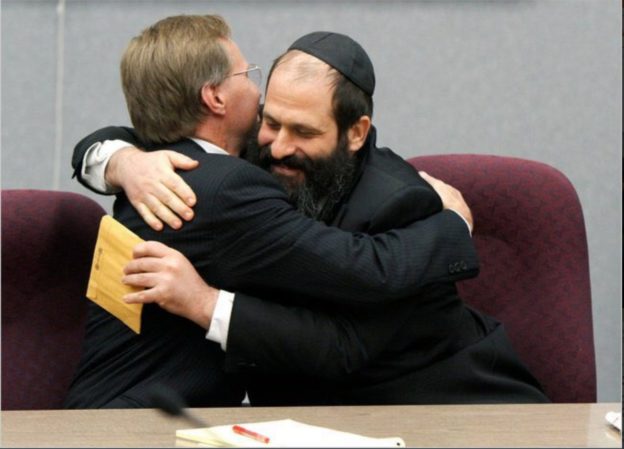
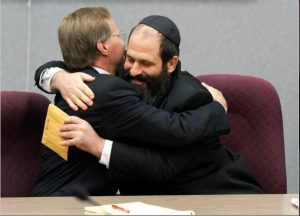
An article of mine about the negative reactions of some in the Jewish community to the release of Sholom Rubashkin and the celebrations thereof, can be read here.
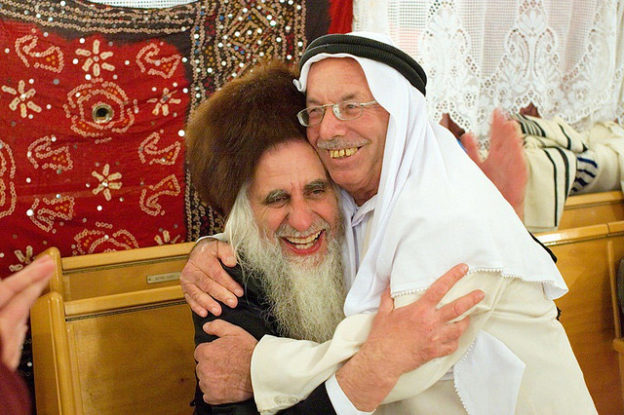
Below is my original draft of a piece I wrote for Forward. The article as it appeared there, though, was substantially edited, and several sentences that I think are important were omitted. So I share the original here. The Forward piece can be read here.
Well, in case anyone for some reason may have been wondering, Peter Beinart, who recently wrote a piece titled “The Orthodox Should Know Better than to Embrace Hatred of Muslims,” doesn’t follow J.K Rowling on Twitter.
Because if the Forward senior columnist and former The New Republic editor did, he would have seen Harry Potter’s creator’s retweet last year of a haredi (or in the Forward’s pejorative preference, “ultra-Orthodox”) rabbi’s message.
The rabbi shared the fact that he had dedicated his presidential election vote to the American Muslim soldier Captain Humayun Khan – who was killed in combat and about whom his father Khizr spoke movingly at the Democratic National Convention. Then-candidate Donald Trump, of course, was then touting his “Muslim ban.”
The Hasidic rabbi, who serves as a media relations coordinator at the national Orthodox Jewish organization Agudath Israel of America (full disclosure: I work there too), shared a photo of himself holding his ballot, alongside a photo of Captain Khan and his gravestone. He wrote that he wanted to highlight how Captain Khan’s “devotion makes (religious) freedom possible.”
The tweet was liked almost 12,000 times and retweeted 5,496 times, including Ms. Rowling’s sharing of the photo and message with her 13 million followers. Not one of whom, apparently, is Mr. Beinart, who wrote recently here that “the inability to distinguish jihadist terrorism from Islam fuels American Jewish hostility toward American Muslims” and that such inability is “particularly true among the Orthodox.”
Mr. Beinart must have also missed the story of the haredi director of a Brooklyn soup kitchen who, after the election, rallied support within his community for Muslim Yemeni neighbors who were protesting the new president’s executive order banning immigration from seven Muslim-majority countries. The haredi also organized support for a beleaguered local Yemeni-owned bodega, complete with “Shalom/Salaam” posters.
Agudath Israel, moreover, issued a pro-immigration statement about the ban asserting that such a move is acceptable only if intended to prevent terrorists from entering the country, only “if tempered by true concern for innocent refugees” and only if “its focus is on places,… not on religious populations.”
Mr. Beinart could be forgiven for not knowing about the hassidic WhatsApp group that calls itself “Isaac and Yishmoel,” created to enable its members to defend unfairly maligned Muslims.
But some research on his part might have turned up the fact that Agudath Israel’s executive vice president chairs the Committee of New York City Religious and Independent School Officials, which includes representation from the Islamic School Association. And that he has worked with Islamic school representatives on a number of issues before the New York State Education Department. And that, on the national level, he works with Islamic school groups under the umbrella of the Council for Private Education.
Agudath Israel has also joined with Islamic groups in amicus briefs in religious liberty cases, and, along with the Orthodox Union, another major national group, has opposed “anti-sharia” laws.
Is there wariness about Muslims among many Orthodox Jews? Yes, as there is among many non-Orthodox ones, among many Episcopalians, Catholics and Hindus too. Is that fair to the vast majority of Muslim citizens, who have no evil designs? No. But, unfortunately, the proclaimed world-conquering designs of Islamists and the malevolent acts committed by extremists exist. The distrust that results is, unfortunately, the responsible Muslim’s unfair burden to bear.
But do Orthodox Jews hate Muslims or seek to harm them? Mr. Beinart should visit one of the Brooklyn neighborhoods where Orthodox Jews and Muslim immigrants live side by side, day by day without friction.
The Forward columnist compounds his slander of Orthodox Jews by engaging in some Orthophobia, in effect accusing haredim of preventing women from marrying, touting genocide and killing babies. Yes, you read right.
There isn’t space here to rebut such outlandishness. Suffice it to say that it is a high haredi ideal to find ways to compel a recalcitrant husband to agree to divorce his abandoned wife; that no people today can be identified with Amalek, and so the biblical injunction to destroy that evil nation cannot be applied; and that metzitza bipeh, the oral suction practiced by some haredim as part of the Jewish circumcision rite, has never been proven to be related to, much less the cause of, any infection in an infant, as three medical/statistics experts have affirmed (http://forward.com/opinion/letters/194118/no-conclusive-evidence-on-circumcision-rite-and-he/) in these very pages.
The Orthodox community’s final crime, in the Beinart courtroom, is having voted in large numbers, and in contrast to the larger Jewish community, for the man currently occupying the White House. Judge Beinart chooses to interpret that fact as the result of Orthodox anti-Muslim sentiment.
Might it be, though, that many haredim simply recognize that judicial appointments comprise one of the most influential powers any president has? And felt that Mr. Trump’s likely choices would prove more sensitive to our community’s concerns about societal issues and the potential erosion of religious rights in America?
We must plead guilty – forgive us – to the charges of being social conservatives and religious rights activists. But not to Mr. Beinart’s ugly and incendiary charge.

In advance of Israeli President Reuven Rivlin’s address to the Jewish Federations of North America’s General Assembly, that group passed a resolution on “Jewish pluralism” in Israel, opposing a bill to enshrine a single conversion standard in the country and asserting that the Israeli Government’s decision to freeze an agreement about the Western Wall has “deep potential to divide the Jewish people.”
It is sadly ironic, although not surprising, that leaders of heterodox movements that have in fact undermined true Jewish unity and continuity by inviting intermarriage and breaking away from the Jewish religious heritage have of late been lecturing others about Jewish unity.
More disappointing still are the unity-cries of the Jewish Federation movement. The historic role of Jewish federations has been to provide support and solace for disadvantaged or endangered Jews and to mobilize the community to come to Israel’s aid when it is threatened. Taking sides in religious controversies anywhere, and certainly in Israel, egregiously breaches the boundaries of that role.
The Jewish Federations of North America, moreover, has traditionally sought to represent all of American Jewry, but here it entirely ignores the feelings of the substantial and growing American Orthodox community.
The Reform and Conservative movements, despite their great efforts over decades, have few adherents in Israel. Most of their members do not visit or settle in Israel, nor do they visit the Western Wall in large numbers. And yet their leaders seem prepared to offend the religious sensibilities of their Orthodox brethren, who regularly visit and move to Israel, and who come to the Kotel to pour out their hearts to G-d there. A holy place should not be balkanized, nor wielded as a tool to advance partisan social goals.
And the patchwork of standards for conversion that exist in America has created an Ameican Jewish landscape where those who respect halacha as the ultimate arbiter of personal status cannot know who is in fact Jewish. Creating in Israel a multiplicity of “Jewish peoples,” as is the tragic reality in America, would not foster unity but its opposite.
To our dear Jewish brothers and sisters, we say: Please do not push for changes at the Kotel that will only cause discord and pain to the vast majority of Jews who worship there. And please realize that the conversion standards that have ensured Jewish unity for millennia are the only ones that can preserve it for the future.

A piece I wrote for Haaretz can be read here.
If you would like a PDF copy of it, just e-mail me at rabbiavishafran42@gmail.com with “Haaretz piece” in the subject line.
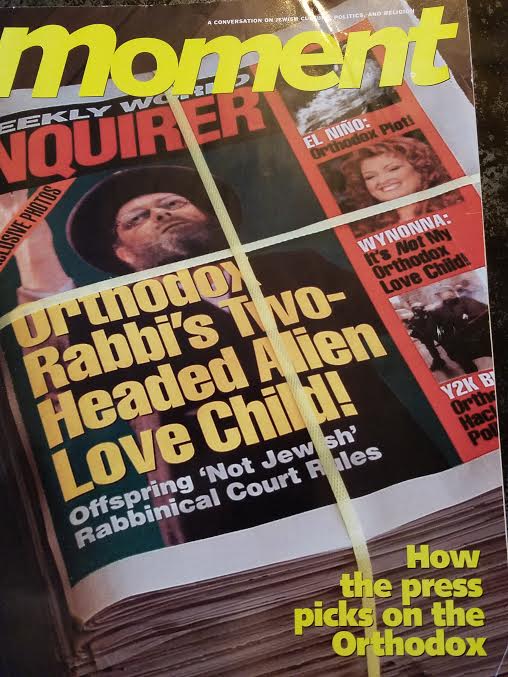
The description of the scene fairly leapt off the page: Shabbos at the Kosel, people davening, a paraplegic in a motorized wheelchair, a group of Orthodox Jews approaching…
“…like a big-league pitcher [one religious Jew] cocked his arm and flung the rock at the man in the wheelchair. The rock hit him in the middle of his forehead, his neck reeled back and blood oozed down this face… Then the adorable little children, who only seconds ago were throwing candy [at a bar-mitzvah boy] turned into savages and started picking up rocks and hurling them at the man. Two of them grabbed the brightly colored prayer shawl from around the man’s neck and cracked it like a whip in his face.
“Some Americans tried to intervene but were themselves stoned. Nearby guards stood by, apparently assuming that the man was getting just punishment for his crime: using electricity on the Sabbath.”
That report appeared in the November 15, 1994 issue of the Arizona State University daily paper, The State Press; it had been recommended for publication by the chairman of the university’s journalism department and the director of the school’s Walter Cronkite School of Journalism. It was, after all, compellingly written and important.
Only one problem: what it described never happened.
Eventually (although after being read by thousands), the report was retracted, when a law student dared to demand corroborating facts and none were found. Pressed for the truth, the aspiring 24-year-old senior journalism major who had penned the piece admitted that the entire account, from start to finish, had been the product of nothing but her own fertile imagination.
It was a particularly gross, but far from singular, example of journalistic malpractice in the realm of reportage about Orthodox Jews. In Moment Magazine’s February, 2000 cover story, which carried the title of this column, I detailed a number of more subtle, but perhaps even more disturbing for the fact, journalistic “liberties” taken by media when “reporting” on the Orthodox community. And in the years since, countless others have come down the pike.
Only last week, a video by an Israeli broadcaster, Reshet TV, depicted reporter Guy Hochman walking around Bnei Brak holding an Israeli flag. The video showed two chareidi motorcyclists grabbing the flag and breaking it.
Another news organization, however, Kol Hazman, reported that the video had been orchestrated by Mr. Hochman himself. And an eyewitness recounted that, before the depicted incident, the reporter had walked “for four hours on the streets of Bnei Brak without being attacked.”
Then a man claiming to be one of the motorcyclists claimed he had been asked to break the flag as part of a “satirical skit,” and just wanted to be of assistance to the reporter.
At first, Reshet TV denied that the video had been manipulated. Several days later, however, the respected Israeli business newspaper The Marker reported that, apparently, it had been, and that the broadcaster had dismissed both Hochman and his editor.
Are there chareidim who act indecorously? Of course there are. But what does it say that media seek out misbehavior, and even, when they can’t find any, fabricate it?
Depressing, no? But we must remain hopeful that, even after so many years of anti-chareidi animus, haters might one day come to their senses.
Just before Pesach, a CNN program depicted Israeli chareidim as a threat to the country, as potentially doing to Israel what the mullahs did to Iran. I wrote an article for a secular Jewish publication pointing out the ridiculousness of that contention.
Most of the responses I received were positive. In the opposite category, though, was one from someone I’ll call E. S. (he signed his full name), a self-described Conservative-turned-Reform Jew. He called chareidim “an abominable blight upon world Jewry and an absolute curse within Israel,” and wants “the entire detestable bunch” to be driven out of Israel “with bayonets and bullets.”
There was more, too, but I’ll spare you. The degree and illogic of the loathing, though, seemed familiar; I remembered something, and decided to write him back.
After politely responding to various accusations he made, I wrote: “I’m heartened, though, by my knowledge that no less a luminary than Rabbi Akiva once remarked that, back when he was an ignoramus, he would have viciously bitten any Torah scholar he came across ‘like a wild donkey’.”
“So I retain hope,” I concluded, “that one day you, too, may have your mud-covered glasses wiped clean.”
His, and others’.
© 2017 Hamodia
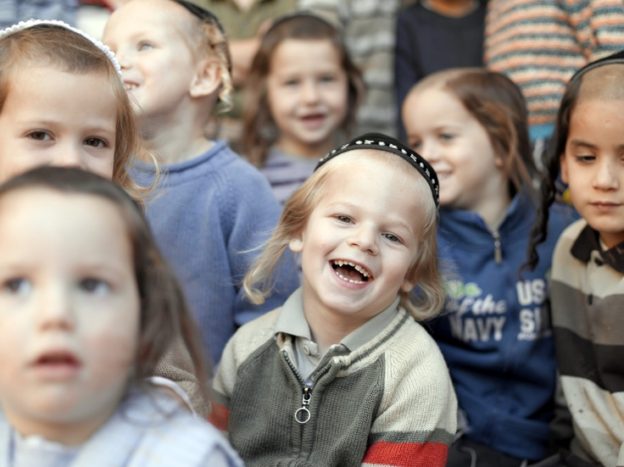
Reza Aslan, the host of the modestly named “Believer With Reza Aslan” on CNN, has rendered his verdict: “Ultra-Orthodox” Jews in Israel are to the Jewish State what the mullahs were to Iran in 1979.
To read my comments on that verdict, please visit:
http://forward.com/opinion/369106/why-cnns-believer-is-unbelievable/